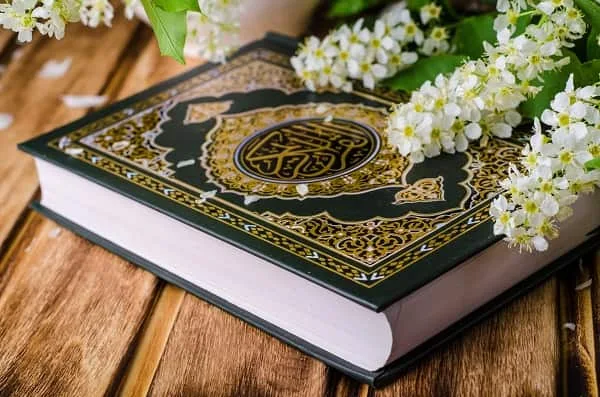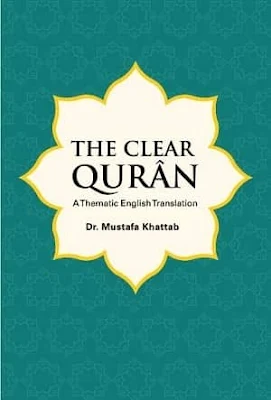Exploring the Quran: A Journey of Divine Messages and Clear Proofs (Book Review)
Dr. Javanshir Gadimov
Quran is one of the most influential books and has had an incredible impact on the world. What does a book that changes the world tell its readers? What is the main message of the Quran? After reading the Quran, I am sharing my thoughts and what I understand from it.
The Quran: A Book of Clear Proofs and Everlasting Guidance (Book Review)
Famous Italian writer and academic, Umberto Eco, wrote a book named "Open Work" where he explores the idea of the "open work" of art, which is a work that is not fully determined by the artist, but that leaves room for the participation of the audience. Eco argues that open works are more challenging and rewarding than closed works because they require the audience to actively engage with the work to create meaning.
During my Ph.D. studies, in one class, the professor assigned us to read Eco's book "Open Work." This led to discussions about well-known "open works" we could identify. Some suggested nature, others mentioned works of literature or art by different artists. Surprisingly, one answer was the Quran, and the professor concurred.
Having read the Quran fully twice, I can affirm that it is undeniably one of the most significant books on Earth. It has changed the course of history and the world. As I previously mentioned, we can perceive this book as an "open work," which means it's not easy to fully comprehend all of its messages. Some ideas, phrases, or sentences (known as "ayahs" in the Quran) can have multiple meanings depending on the reader, the time of reading, and other contextual factors. Throughout history, Islamic scholars have written numerous tafsirs (explanations or interpretations) of the Quran, and some tafsirs even span 30 volumes.
While I cannot claim to understand every detail of the Quran and all of its ayahs, I can certainly speak about its main message. Additionally, some Quran translations come with footnotes where translators provide explanations for critical aspects that readers should be aware of.
The Main Message of the Quran
The main message of the Quran is to help us recognize the one who created us all—God, Allah, the only Creator. It emphasizes that no one else should be referred to as a creator. Disregarding this fundamental truth can invoke God's wrath upon us.
Throughout history, God sent numerous messengers like Moses, Abraham, and Jesus, among many others, to teach people the truth about Himself. Their purpose was to deliver a message, sometimes conveyed as good news and at other times as a warning.
“This ˹Quran˺ is a ˹sufficient˺ message for humanity so that they may take it as a warning and know that there is only One God, and so that people of reason may be mindful.” (Abraham – Ibrâhîm, 52)
It is good news for those who believe and a warning for those who deny God's messengers and revelations. People are mostly divided into believers and disbelievers. The Quran addresses both groups directly. Additionally, there is a third party, the hypocrites, who claim belief but secretly disbelieve and create discord among believers. However, Allah, in the Quran, reminds us, 'Allah is all-seeing and all-hearing,' and 'Allah knows what is in your hearts.'
Related post: Who is Allah, the only God, our Lord, and the Creator?
How God and Quran Ask Us to Believe: Blindly or with Clear Proofs
Some may ask, "How would we know that there is God? How would we believe? What kind of faith does the Quran ask us to have?" First of all, this book does not tell us to believe blindly. Instead, it shows us clear proofs. All prophets who came to people in different times, tribes, cities, and regions presented clear proofs. That's why the Quran states:
“If you falter after receiving the clear proofs, then know that Allah is indeed Almighty, All-Wise.” (The Cow - Al Baqarah, 209)
Thus, the Quran does not simply ask its readers or people to believe; instead, it provides evidence and proofs. The same was true for all the prophets. For example, when Moses went to Pharaoh and asked him to believe, he had to present some proofs to demonstrate that he was truly the messenger of God. Some people accepted the proofs, while others continued to deny.
Prophet Muhammad's proof is this very Quran we are discussing. He was an illiterate man, making it impossible for him to produce this great book and its words in Arabic after the age of 40. Despite that, all the people of his time accepted it. Hence, the Quran says:
“He makes His revelations clear to the people so perhaps they will be mindful.” (The Cow - Al Baqarah, 221)
The Quran and its ayahs convey a message, but God has an even greater message for people through His creations. If you know how to observe and understand, you will find clear proofs of God's existence and oneness. The Quran also explains it in this way:
“Have they not then looked at the sky above them: how We built it and adorned it ˹with stars˺, leaving it flawless? As for the earth, We spread it out and placed upon it firm mountains, and produced in it every type of pleasant plant—˹all as˺ an insight and a reminder to every servant who turns ˹to Allah˺. And We send down blessed rain from the sky, bringing forth gardens and grains for harvest, and towering palm trees ˹loaded˺ with clustered fruit, ˹as˺ a provision for ˹Our˺ servants. And with this ˹rain˺ We revive a lifeless land. Similar is the emergence ˹from the graves˺.” (Qãf – 6-11)
After revealing His message and providing clear proofs in the world we see every day, God asks in the Quran, "Will you not then be mindful?" (Hud, 30) and "Will you not then understand?" (The Believers – Al-Mu'minûn, 80). These types of questions are repeated in the Quran, encouraging its readers to consider, think, be mindful, and understand. Therefore, the Quran does not ask us to believe blindly; instead, it urges us to observe, contemplate, think logically, and use science to understand our Creator.
Related post: Who is the Best Artist?
The Duty of the Prophets
The Quran clearly tells the reader and also the Prophet that his duty is solely to deliver the message, to warn the people, and to convey what has been revealed to him. He is not sent to force anyone to believe. The choice to believe or not lies with the people themselves. Those who choose to believe in Allah are promised a good future, paradise, gardens, and eternal bliss. On the other hand, for those who deny God, pray to idols, or worship other self-made gods, the Quran promises punishment and torment in the fires of Hell.
“Say, ˹O Prophet,˺ ‘O humanity! The truth has surely come to you from your Lord. So whoever chooses to be guided, it is only for their own good. And whoever chooses to stray, it is only to their own loss. And I am not a keeper over you.’” (Jonah – Yûnus, 108)
Throughout history, all prophets faced denial from people when they came with God's message. They were called liars, madmen, and when they presented miracles as proof, people labeled them as magicians.
“We have sent you ˹O Prophet˺ only as a deliverer of good news and a warner to all of humanity, but most people do not know.” (Sheba – Saba', 28)
The role of the prophets was not to compel belief but to deliver the divine message and give guidance to humanity. However, it remained the individual's responsibility to choose their path, either accepting the truth and guidance, or rejecting it at their own peril.
Stories of Other Prophets
The Quran is a divine scripture sent to the last prophet, Muhammad (peace be upon him). However, it also mentions other prophets who were bestowed with scriptures from God. These stories narrate the accounts of Abraham, Moses, Jonah, Jesus, and his mother, Mary.
One of the most engaging narratives is about Prophet Joseph. He endured betrayal by his brothers, was sold as a slave, and thrown into prison, but ultimately became one of the most significant figures in Egypt.
These stories of other prophets are not merely for us to read and enjoy; they serve as examples. In some cases, the people to whom these prophets were sent, like Lot and Noah, faced destruction because they denied God and engaged in even worse deeds. Hence, God tells us how He punished them. This is how the Quran conveys it:
“You passed by the ruins of those ˹destroyed peoples˺ who had wronged themselves. It was made clear to you how We dealt with them, and We gave you ˹many˺ examples.” (Abraham – Ibrâhîm, 45)
These accounts of past nations and their fates serve as cautionary tales, reminding us of the consequences of denying God's message and engaging in wrongdoing. They provide valuable lessons for reflection and guidance in our own lives.
These stories are meant to teach us about God's justice and mercy. They show us that God is always watching over us, and that he will punish those who do wrong. But they also show us that God is merciful, and that he will forgive those who repent.
Allah's Mercy: He is All-Forgiving and the Importance of Repentance
One of the main aspects that deeply captured my attention while reading the Quran is Allah's constant emphasis on His attribute as the "All-Forgiving, Most Merciful." Throughout the Quran, this aspect is mentioned numerous times, serving as a reminder that there is always an open door for repentance and returning to the right path. This profound message appears countless times, consistently urging people to seek forgiveness, regardless of their sins, and to turn back to God, who is ever ready to forgive and show mercy. One powerful example of this message is found in the following verses:
“Tell them, O Prophet,˺ 'Worship none but Allah. Surely I am a warner and deliverer of good news to you from Him. And seek your Lord’s forgiveness and turn to Him in repentance. He will grant you good provision for an appointed term and graciously reward the doers of good. But if you turn away, then I truly fear for you the torment of a formidable Day. To Allah is your return, and He is Most Capable of everything.'” (Hûd – Hûd, 2-4)
These verses beautifully convey the divine invitation to seek forgiveness and turn to Allah with sincere repentance. The promise of Allah's mercy and rewards for those who do good acts provides hope and encouragement to all who seek His forgiveness. Simultaneously, the warning of the consequences for turning away serves as a reminder of the importance of taking this opportunity seriously. Indeed, Allah's boundless mercy and forgiveness hold the power to transform and uplift those who sincerely seek His guidance.
Worldly Life and Hereafter
Another key message of the Quran is the belief in the Hereafter, the life after this world. When the Prophet delivered this message to the Arab pagans, they ridiculed him, questioning how Allah could possibly recreate them after they have died and turned to ashes.
In response to such skepticism, the Quran provides numerous examples across various chapters, illustrating how Allah has the power to bring life out of the dead and vice versa. To Him, such acts are effortless and straightforward.
The Quran emphasizes the certainty of the Hereafter and the reality of life after death. It reassures believers that just as Allah created life from nothing, He can undoubtedly recreate life after death. This profound belief in the Hereafter serves as a source of hope, accountability, and purpose in the present worldly life.
Related post: The Power of Unwavering Faith: Lessons from 'Jane Eyre' on Life and Death
Which Quran Translation to Read?
I chose to read "The Clear Quran," a translation of the Quran into English by Mustafa Khattab, first published in 2015. This version is written in simple, easy-to-understand English, based on the original Arabic text, though it is not as literal as some other translations. This makes it a great choice for those seeking a more readable translation.
Before delving into my reading, I conducted research and explored various Quran translations. Among the options available, I considered:
- The Meaning of the Holy Qur'an (English Arabic Text) by Abdullah Yusuf Ali (2001)
- The Qur'an by M. A. S. Abdel Haleem (trans.) - (Oxford World's Classics) - Oxford University Press, USA (2008)
- The Message of The Qur'an by Muhammad Asad - The Book Foundation (2003)
- The Clear Quran: A Thematic English Translation by Mustafa Khattab - (Allah edition)
After careful consideration, "The Clear Quran A Thematic English Translation by Mustafa Khattab" stood out to me for its readability and ease of comprehension.
If you wish to read the Quran, I encourage you to explore these translations and others to find the one that resonates best with you. Additionally, I read some parts from "The Message of The Qur'an by Muhammad Asad," which is ideal for those who appreciate more extensive footnotes.
The Quran is an incredibly profound and vast book, holding deep meanings that continue to be discovered. While I have attempted to provide the main points of what this book entails, there is much more to explore. My belief in Allah, His books, His Prophets, and the Hereafter is strengthened by the Quran's teachings. If you are searching for clear evidence to strengthen your own faith, the Quran is an excellent starting point. With an open heart and mind, I am confident that God will guide you towards the answers you seek.











